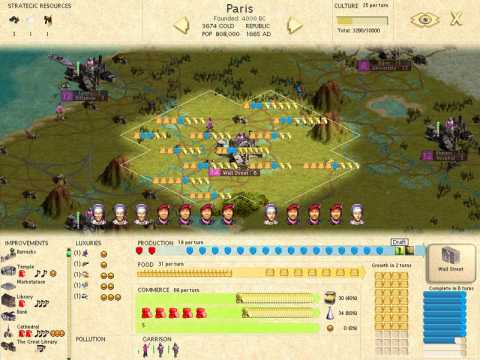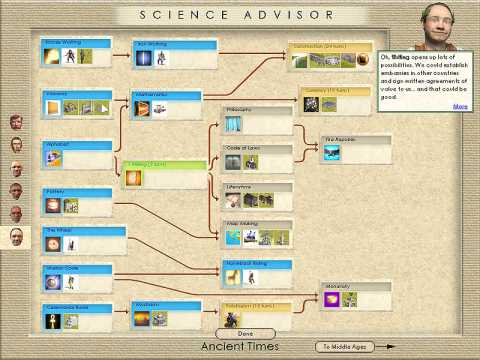Overview
Dominate the world through diplomatic finesse, cultural domination and military prowess. It gives players the opportunity to enjoy unmatched strategic gameplay alone or against players from around the world. A complete (or Gold) edition of Civilization III includes the original game as well as the Conquests and Play the World expansion packs.
As in previous Civilization games, the player must manage an empire of cities in a turn-based system, dealing with issues of war, culture, economics and more.
Gameplay
Civilization III is based around building an empire, from the ground up, beginning at start of recorded history and continuing beyond the current modern day. The player's civilization is centered around a core of cities that provide the resources necessary to grow the player's cities, construct city improvements, wonders, and units, and advance the player's technological development. The player must balance a good infrastructure, resources, diplomatic and trading skills, technological advancement, city and empire management, cultural influence, and military power to succeed.
Empire management City Interface

The player must choose which resources surrounding their cities they should develop, oversee creation of improvements and units, decide occupations for citizens through their city interface. Cities create "shields", or units of production, wealth and scientific research each turn based on their resources, improvements, Wonders, connections to other cities, etc.
Citizens have nationality (so a conquered city will have a mixed citizenship) and their happiness, or lack thereof, affect the city for the positive (celebrations and more production) or negative (civil disorder).
Corruption is much more severe than in previous installations, affecting commerce, production and creating waste, depending on government and improvements.
Resources
There are three types of resources: bonus, strategic and luxury. Each has benefits of increased production/food/commerce and allow training of specific units or help overall civilization happiness, respectively. Luxury and strategic resources can be traded.
Scientific Research

Technology tree for Ancient times
Research of new technologies is pursued in a technology tree. Research time is based on scientific funding and the relative advancement of the technology versus ones' overall advancement. Completing research of a new technology allows access to new units, improvements and wonders of the world, as well as special bonuses and abilities. Technology trees are divided into four ages (ancient, middle, industrial and modern) which progress as certain technologies are researched. They may also be traded, exchanged and demanded like any other commodity.
Improvements
These are things that help cities grow, like a bank, granary, barracks, etc. Certain technologies, as well as a number of shields, are required for each improvement.
Wonders of the World
Like in previous titles, there are Great Wonders which yield major benefits to an empire. There may only be one of each Great Wonder constructed in any one game. They are available by age and cannot be rebuilt if destroyed in combat.
A new addition to Civilization are small wonders. They are similar to Great Wonders in their effects, but are available to all civilizations, although only one of each may constructed in each empire.
Culture

Cultural takeover in action
A new feature in Civilization III, culture acts as a function of a city's influence over local terrian. Acquiring cultural improvements and Wonders increase culture in the city and expand the area of influence surrounding it, allowing access to more resources and possibly peaceably taking over nearby cities.
Combat
Each unit has an attack and defense value, when in combat, the appropriate values are compared (attack vs defense) and determines the winner. Different terrain provide additional defensive bonuses. A random number generator's result is then added to keep combat exciting.
Certain units, including siege weapons, planes and certain ships, can bombard units or cities, possibly softening targets or destroying improvements and population, respectively.
Units have levels of experience and through combat can advance from conscript and regular to veteran and elite. If an elite unit succeeds in combat, there is a small chance a Great Leader will be created, who can in turn create an army which contains multiple units (whose values add up in combat) or help in the production of a city project.
Victory Conditions
- Conquest: Destroy all other civilzations.
- Domination: Control two thirds of the world's land and population.
- Cultural: 20,000 culture points in one city, or a certain threshold (100,000 on a standard map) and at least double that of any other culture.
- Diplomatic: Be elected by the other civilizations as U.N. Secretary General, after the creation of the United Nations wonder.
- Scientific/Space: Build and Launch a colony spaceship to Alpha Centauri.
- Endgame/Histograph: The histograph provides a relative indicator of each civilization's score, power, and culture at any given time. If the game runs out (2050AD), the civilization with the highest combined score wins.
Civilizations
Each civilization starts with two qualities that give them bonuses in certain respect as well as determine their first two technologies. Also, each civilization has a special unit that is a slightly improved version of a standard unit and have a historical basis.
Listed here are the 16 civilizations available in the original release, others are available in the two expansion packs.
- America
- Aztecs
- Babylon
- China
- Egypt
- England
- France
- Germany
- Greece
- India
- Iroquois
- Japan
- Persia
- Rome
- Russia
- Zulus
PC System Requirements
Recommended:
- Windows® 2000/XP (only), Pentium® II 400 MHz
- 128 MB RAM
- 1.7 GB Free HDD space
- Windows® 2000/XP compatible video card*
- Windows® 2000/XP compatible sound card*
- DirectX® version 9.0b (included) or higher
* Indicates device should be compatible with DirectX® version 9.0b or higher.
Log in to comment